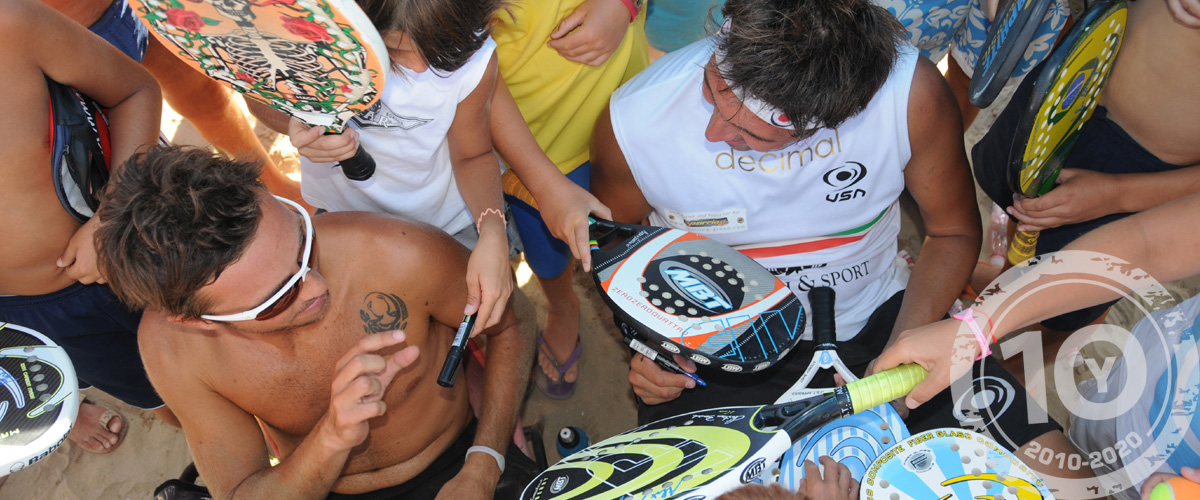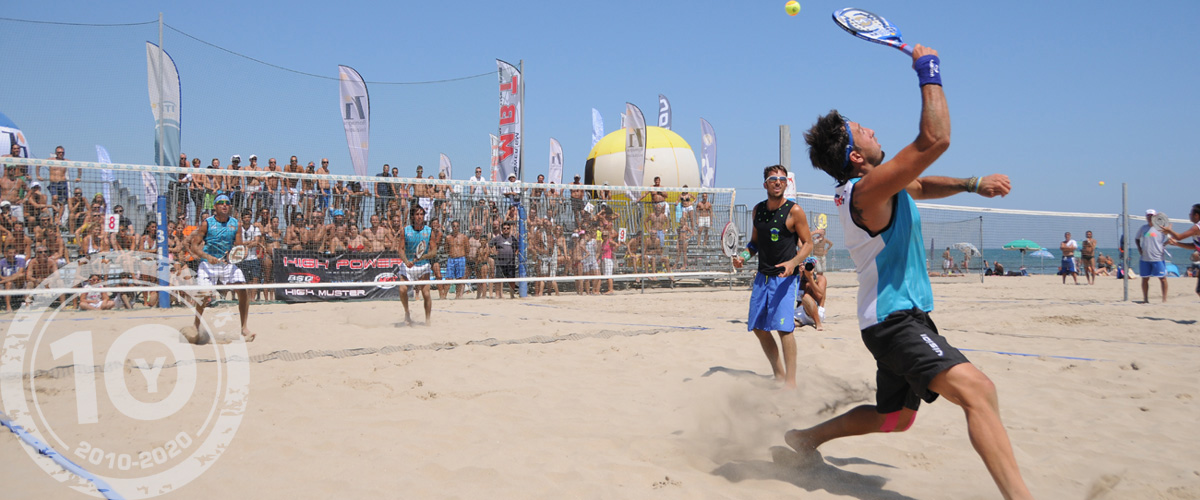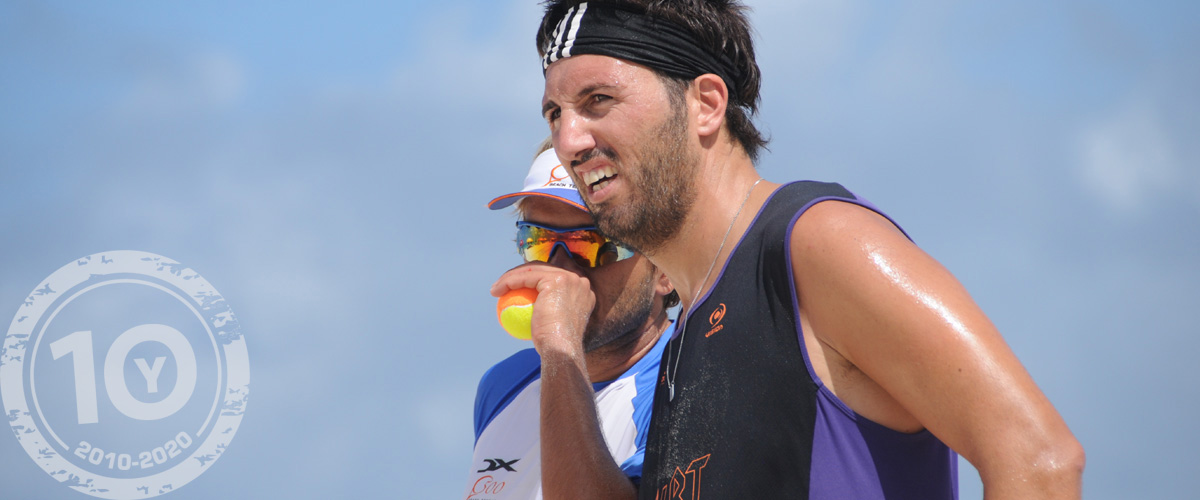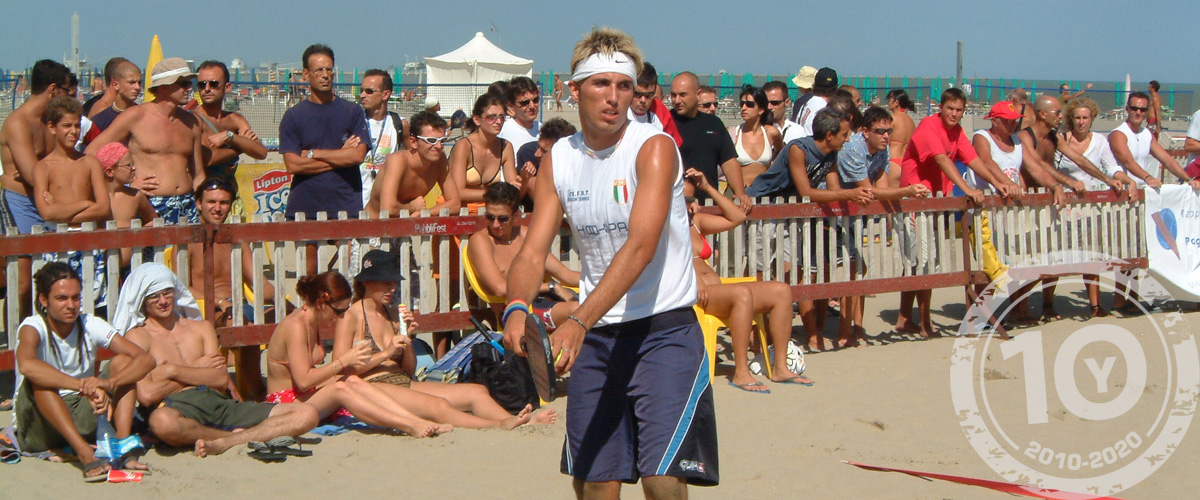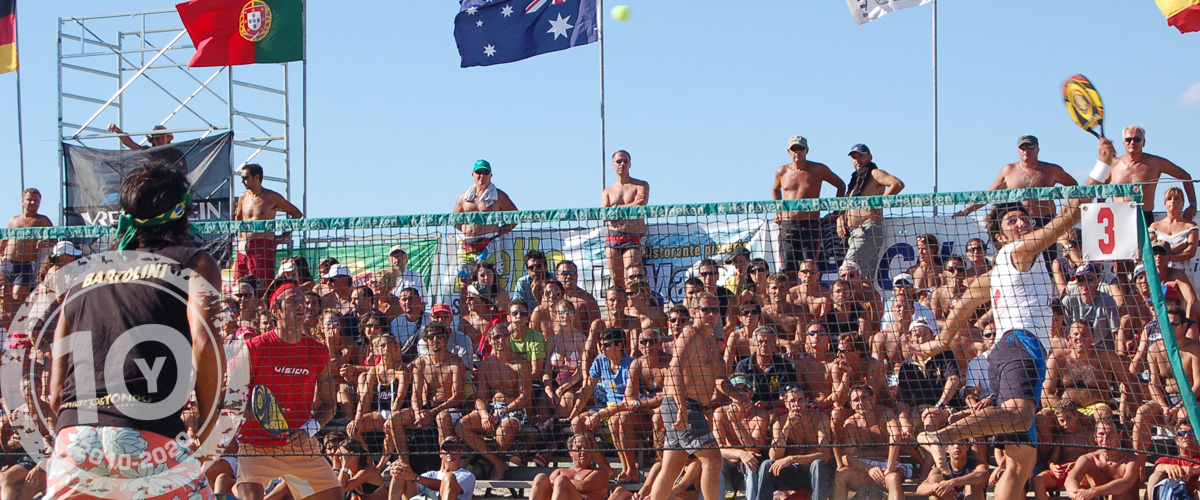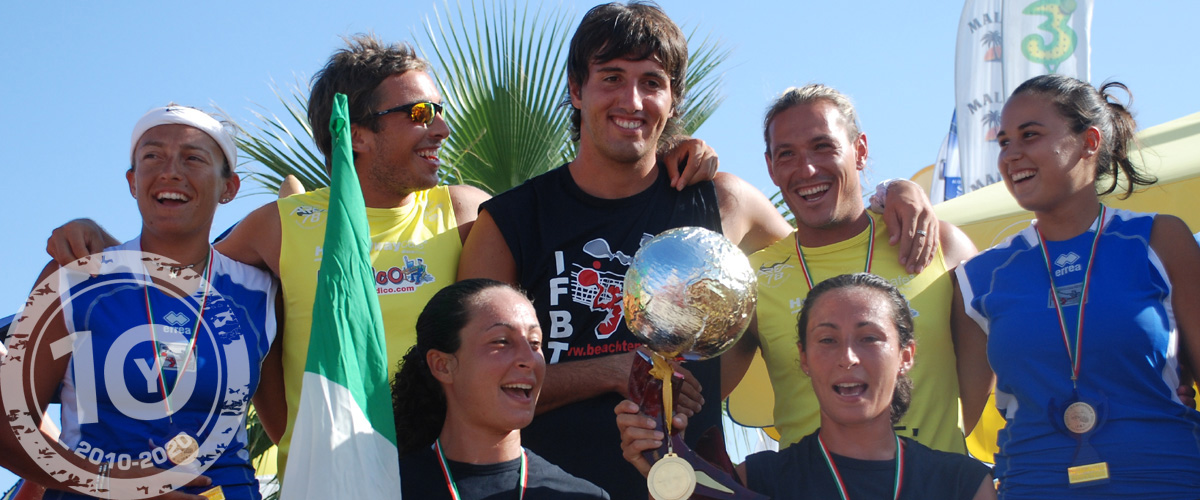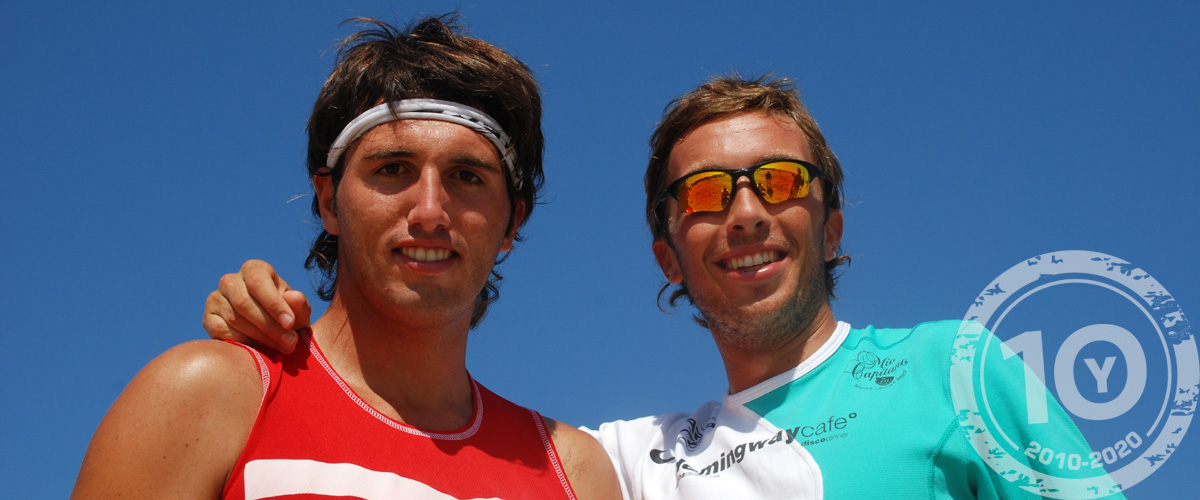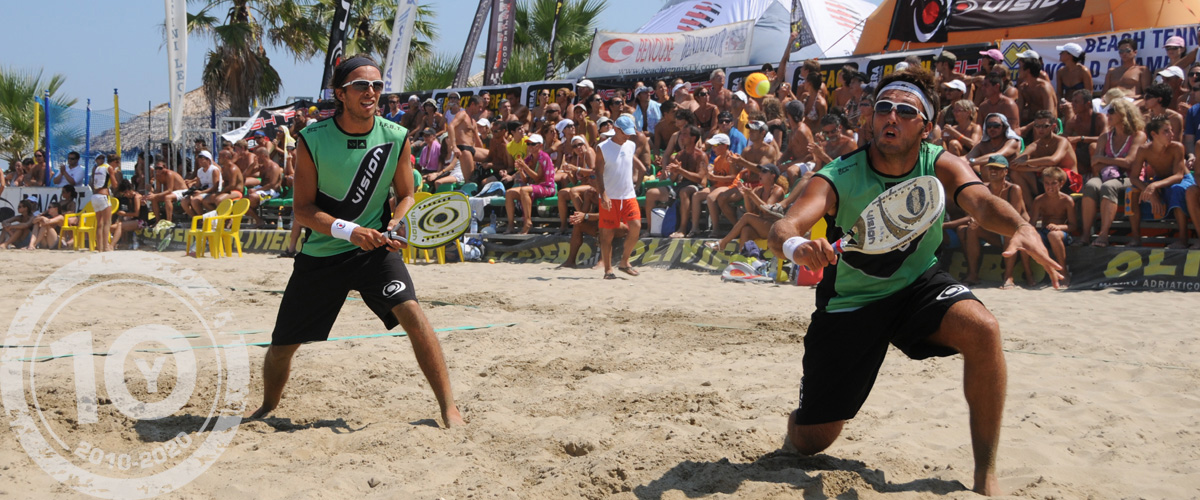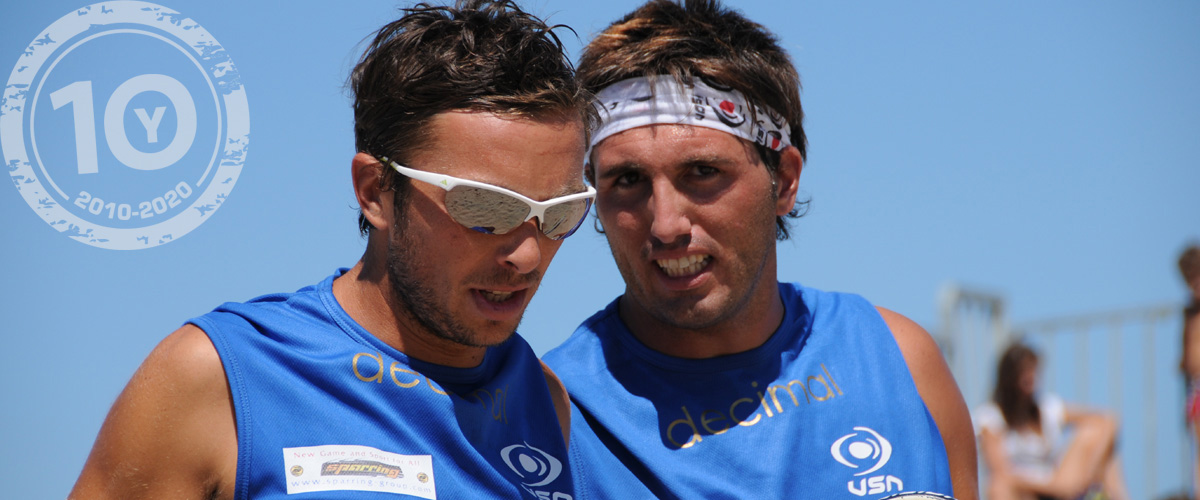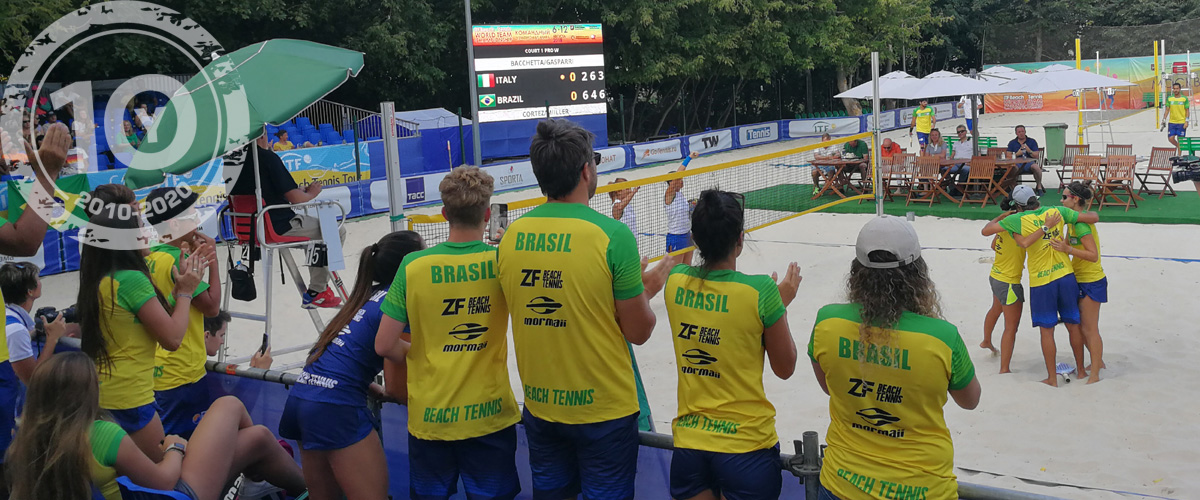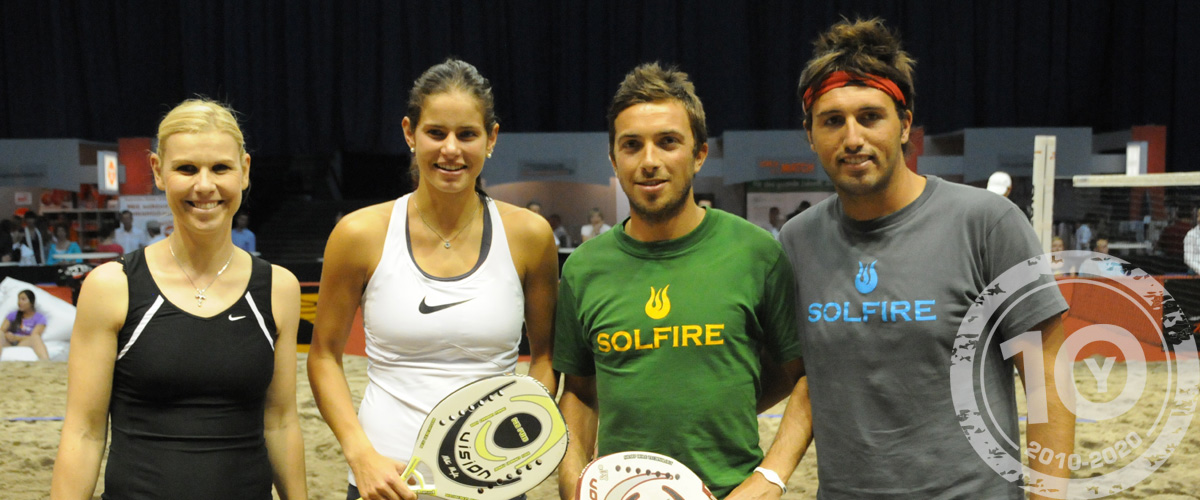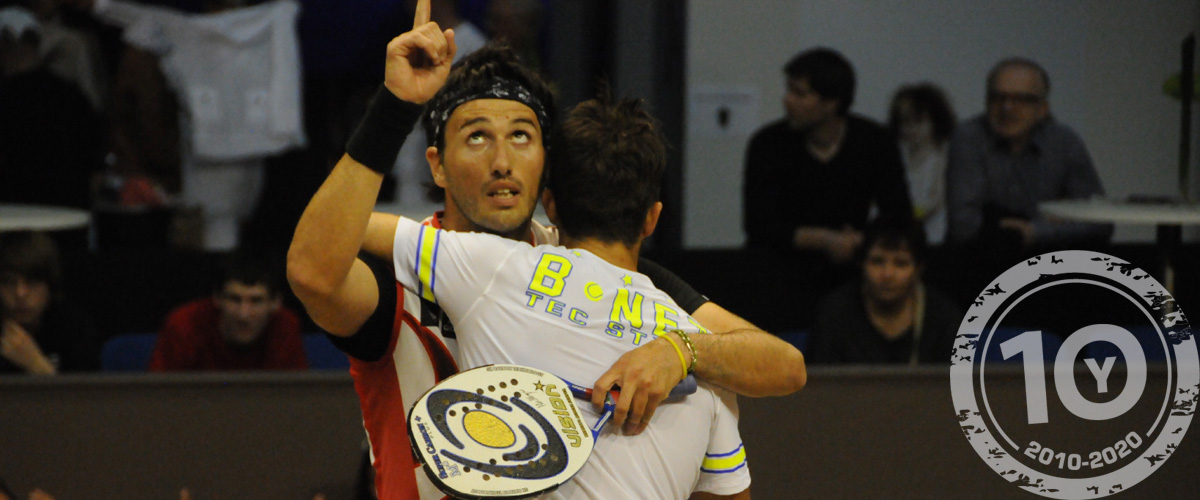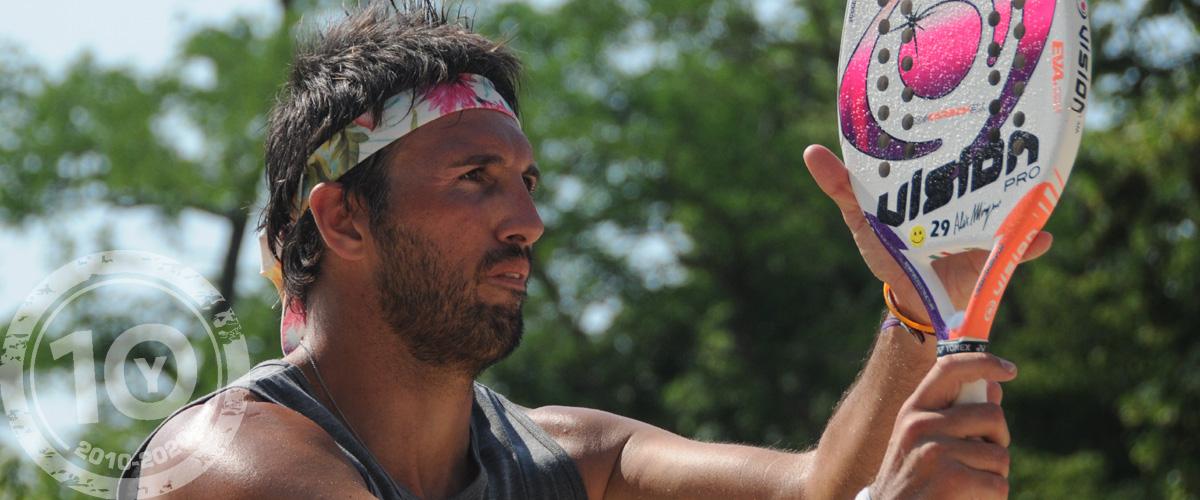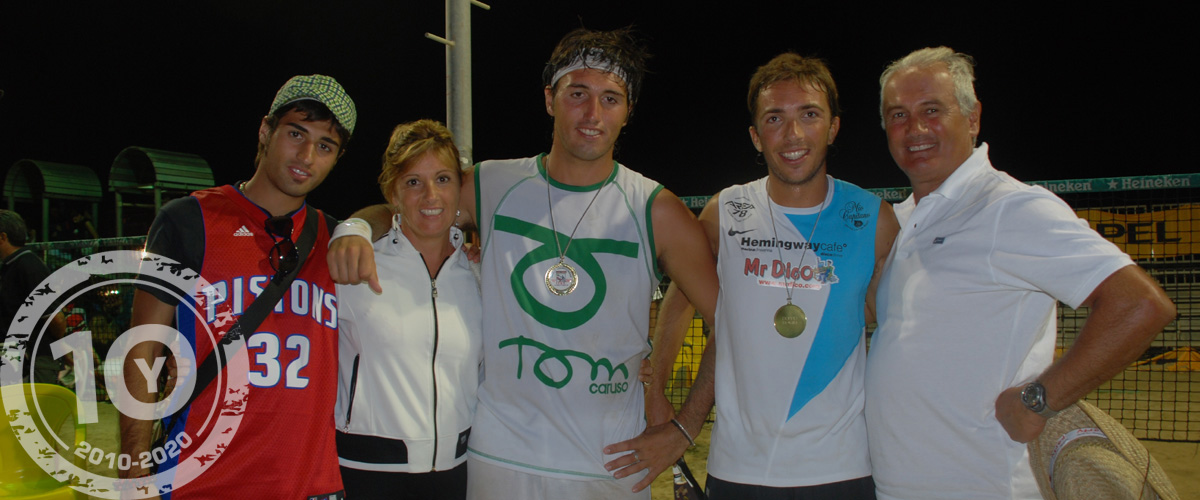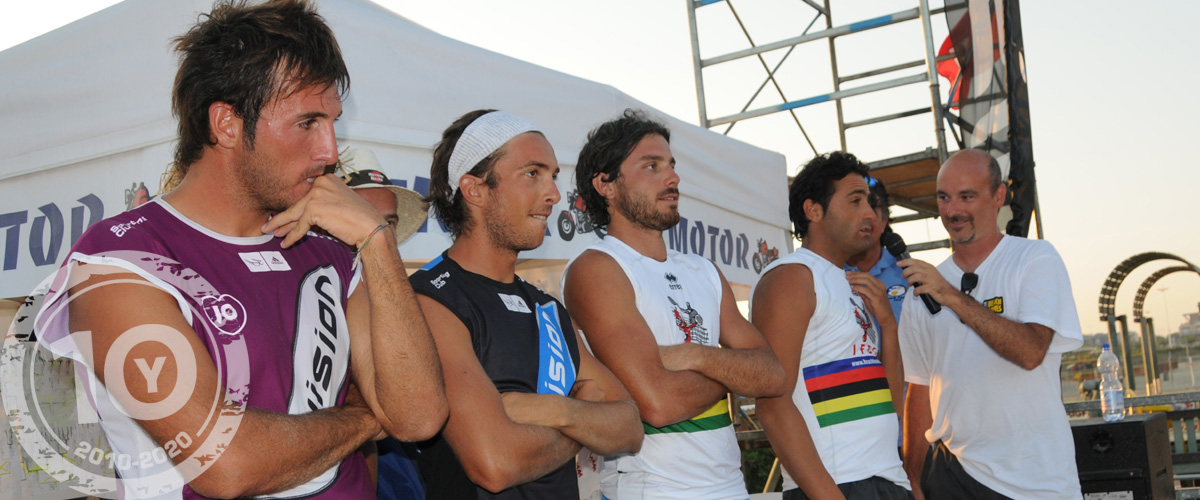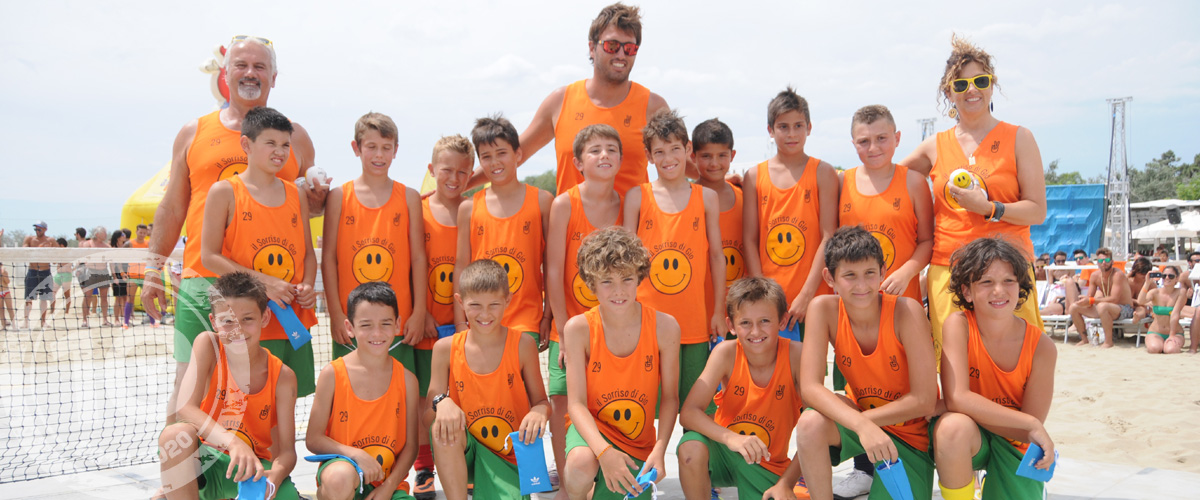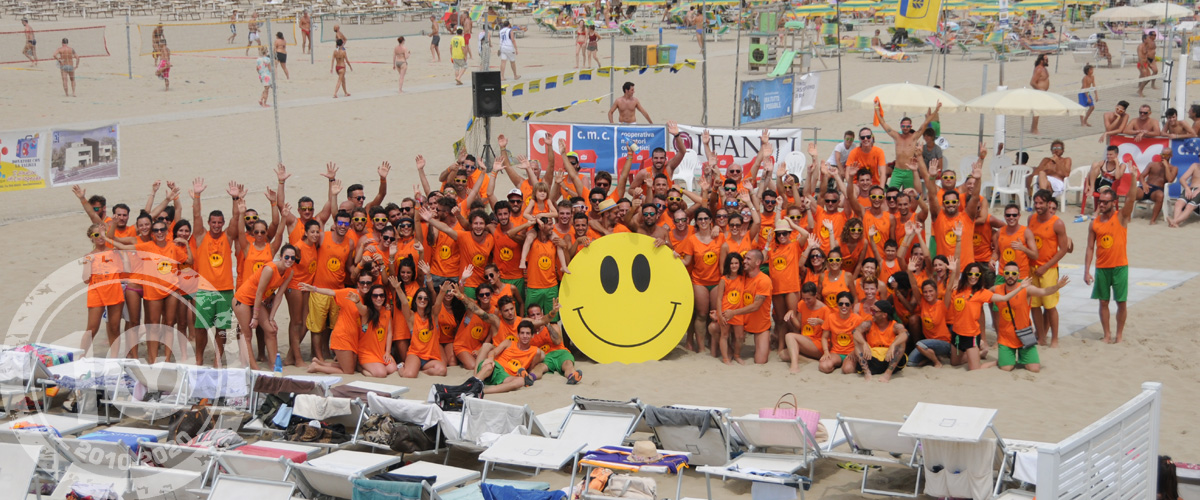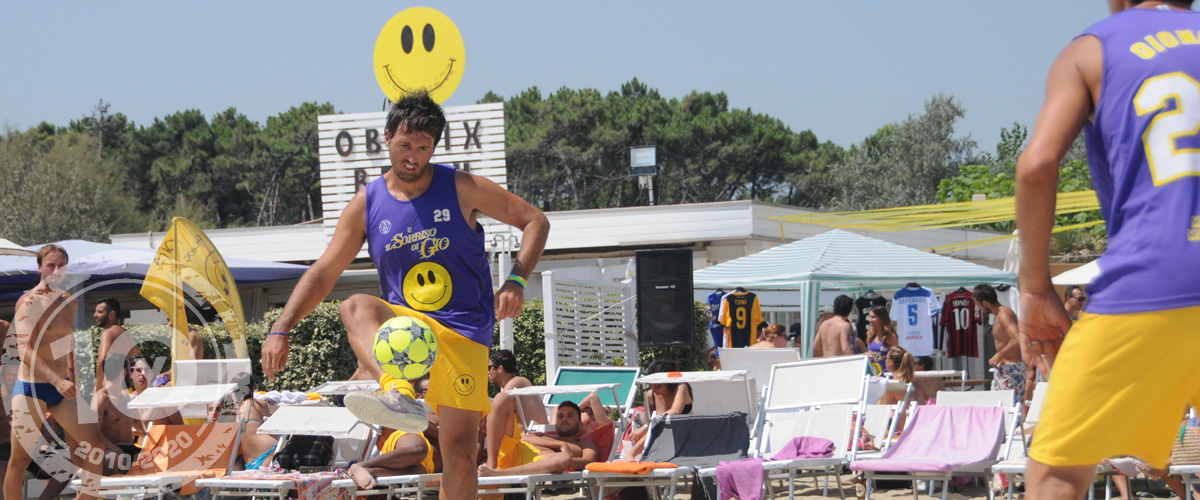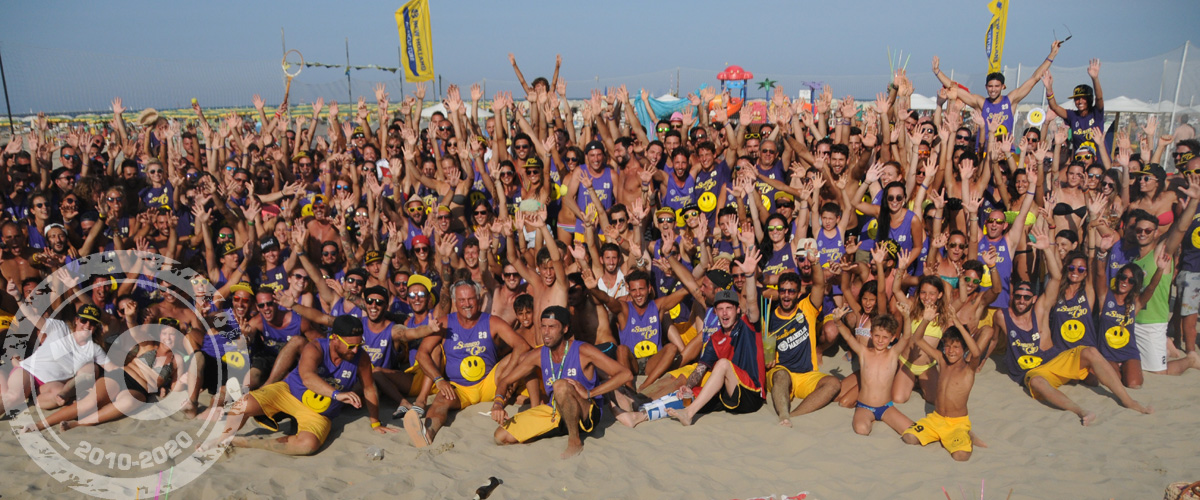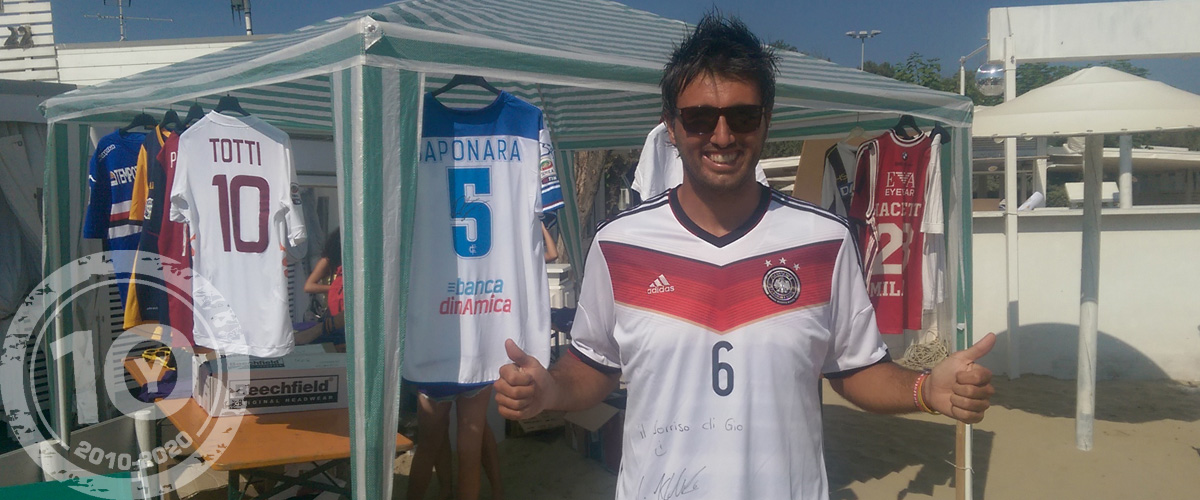ALEX MINGOZZI
Player, Coach, TeamcaptainThe Porsche Beachtennis Grand Prix in Stuttgart was an unbelievable tournament. If we had this event today, it would be one of the biggest world wide. Everybody would want to participate.
Alex Mingozzi
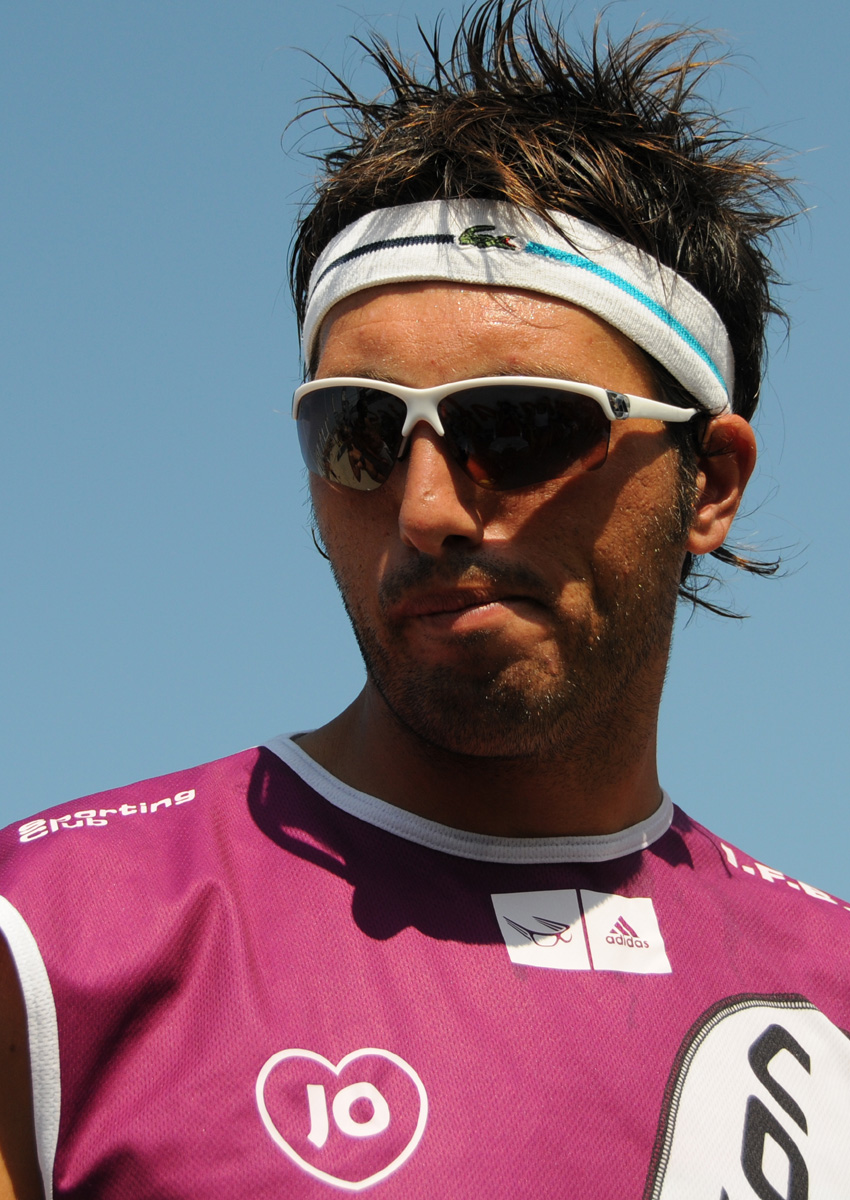
ALEX MINGOZZI
In commemoration of the 10-year anniversary of BEACHCLUB2010®, we wanted to give a voice to our friends and faithful companions who have been by our side throughout our journey. We spoke to players, organizers and commentators about their beach tennis stories. You can find them in the following interviews.
Alex Mingozzi, 38, was born in Cotignola/Italy and soon got enthusiastic about sports. Judo, BMX, swimming, soccer or beach-volleyball. At the age of 13 at random he discovered beach tennis. His father had taken him to the beach in Ravenna. It was in 1998, beach tennis in Germany wasn't even known, when he played his first tournaments. Soon after that he won his first trophies in Italy, later than abroad: US, Spain, Switzerland, Germany, Chech Republic, Aruba, Reunion - Alex Mingozzi has travelled almost every angle of this planet. In his bag always the beach tennis racket. Together with Matteo Marighella he formed the best duo on the tour. Meanwhile he lives in Brazil, he still plays tournaments, but works mainly as a coach. In 2018 he took over the brazilian national team and led it to two consecutive wins at the WTC in Moscow.
In our interview he talkes about his biggest wins, the role of the ITF and beach tennis in Germany.
Are these ten centimeters really changing the game of beach tennis?
Yes, the change in the net height to 1,80 meters is a tremenous difference for the game of beach tennis. It becomes more tecnical, there will be more rallies to watch. As a consequence the sport will become much more interesting for television.
This rule is helping you obviously, you made some good results lately with your brasilian partner Daniel Schmitt. Are you on your way back to a great shape?
For me this is a really good rule change, because I am a tall player with good tecnical basics and a lot of experience. This net height at 1,80 meters gives me a little bit more time to decide my next play. A few weeks ago, at the first event with the new rule, we did great and beat some really good opponents.
The International Tennis Federation ITF has not only changed the net height; the ITF tries some more rules to change the game of beach tennis. How can these help in the growth of beach tennis?
The ITF certainly changed a lot of things lately. I am convinced that the ITF is well organized to make beach tennis better. They changed the net height, this was a fundamental change. It's not easy for players to adapt. But it looks like players are satisfied with this rule change, because it makes the game more spectacular. Then there is the long tiebreak in the third set, which will be very difficult to play, because it is a short way to end the match. It still needs to be seen if this is a good solution or not. The game becomes more random with it.
Tha fact remains, that the ITF has to satisfy both players and organizers and the federation has to promote beach tennis on its way to the Olympics. How can this balancing act be managed?
The ITF has without any doubt to take care of the sports issues. It's not easy, to satisfy all the different parties, because these are new rules. But the ITF in deed tries to lift beach tennis to a more professional level in order to get to the Olympics - or at least in television.
How do you see the role of the ITF in the beach tennis world? What else can the ITF do for beach tennis?
The main goal of the ITF should be to bring beach tennis to the whole world. In my opinion the responsible guys should take more marketing measures in order to get more sponsors. They could then organize an international tour like in beach-volleyball. With a big brand as main sponsor. Let's wait and see what happens, but ITF is moving into the right direction.
A huge problem in the beach tennis world is in deed the absence of a main sponsor, who could bring beach tennis on television. What could be the solution for this?
Maybe a main sponsor is missing because beach tennis is not on television. I am convinced that beach tennis has a great potential, here in south america it's working very well. And soon we could find some big sponsors here.
Now Decathlon got involved, and your former partner Matteo Marighella is sponsored by adidas. What do you think about the involvement of these companies? And what kind of impact do they have on the italian brands that are working since the beginning of the game?
For sure it is very important that these companies got involved with beach tennis. There are also some big companies from padel tennis that will join the market. Matteo and I were sponsored by adidas years ago, then with sun glasses. Decathlon is an important brand to step in, it can help. But the italian brands will stay strong, they still have the best quality rackets to offer. At Vision, MBT or Turquoise they sell the best rackets, and for sure they will continue for some more years to be on top of the market; but they need to be well organized.
You live in Brazil for years now. How is the situation over there, is beach tennis growing?
Beach tennis is exploding in Brazil, we have beach tennis communities everywhere. It is probably the country where beach tennis had its best development. Even better than in Italy, we probably have the most players world wide.
What are the main goals of these beach tennis communities?
The beach tennis schools are working very well, I have to of them myself over here in two different regions. Meanwhile I work together with people from other regions to expand my brand. We have more than 300 players and a long waiting list. That's why I am teaching some new coaches.
In your home country Italy on the other hand beach tennis seems to stagnate. Less tournaments, a lot of players who quit, especially young players. How as this development possible and how can it be stopped?
In Italy the federation FIT unfortunately supports more padel tennis and less beach tennis. That's a pity, because beach tennis has lots of potential. Then, a lot of important players left the country. In the Emilia-Romagna region, which has been the center of beach tennis for years, there are less players now. This is to be regretted, because there are still a lot of top players in Italy. If you take a look on the world rankings, there are ten Italian players amoung the first 20. This is a sign, that beach tennis on a professional level is still very strong in Italy. But on the amateur level the interest in beach tennis has decreased. Here in Brazil, a huge country, we have a lot of beach tennis schools, even if the level of teaching is not that high yet. But there are a lot of people, who show interets in the beach tennis business and have a great desire to help developing beach tennis. More than in Italy.
In 2019 we started the Beach Tennis Tour Liguria with two events in Spotorno and Finale Ligure. You have been to Pietra Ligure in 2004, and only two years later you played a tournament in Albisola. What momories do you have of this trips and what do you think about the idea to bring beach tennis to this region of Italy?
For different reasons the Liguria region is beautiful because of its unbelievable nature. For sure a place with an incredible landscape to play tournaments. The lack of big beaches is the biggest problem of this region. But I'm sure that all the players would love to come to play in Liguria because there have never been a lot of events there, where people could try to unite tourism with beach tennis. I remember well when I first got there and I also remember the difficulties they had. You were able to bring beach tennis back. Let's hope that next year the games will go on and you can continue with your tour. From what I've heard from players they must have been great events. I hope that we can go back to play as soon as possible to bring back beach tennis in Liguria.
When we look back on the beginning of this millennium, when beach tennis was organized by IFBT to the period with FIT and then the entry of ITF - how do you see the development of the sport?
In the beginning we had big problems with the different federations. It all startet with IFBT, they had an important role in the expansion of beach tennis. The ITF certainly helped pushing the sport to an international level and unify everything, especially the rankings. Now we have the IPIN, that seems to be well organized, very clear. Without any doubt this is a big step for the future of beach tennis.
What was missing in the boom times?
Unfortunately we had this big differences in Italy, one federation against the other, seperations, and this is why we could't make any steps forward with beach tennis. Now these steps will probably be made in other countries. Even in America, where beach tennis had a rough start, now people start playing more and more, and here in Brazil beach tennis meanwhile is very popular. I assume that beach tennis will grow faster in South America than in Europe.
Together with Matteo Marighella you yourself wrote a big chapter of the history of beach tennis. From 2007 to 2009 you were almost unbeatable. Why did this combination work so well? When and for what reasons did it break up? What did remain from this era?
Matteo and I pleyed together for many years and we probably were the ones with the most wins and trophies. It's a pity, that these statistics were never recorded by the ITF. We dominated beach tennis for five years and had some very tough opponents like Marco Garavini, Luca Meliconi, Alan Maldini and later Alessandro Calbucci. Michele Cappelletti e Luca Carli were in their younger years but already a great team. Our results have fallen somewhat into oblivion, because the ITF rankings started only in 2010. I then injured my shoulder and subsequently we couldn't confirm our high level of play. Because of my many injuries we could't get back to the top. That's a pity, because I'm sure that we would have had some more successful years together. After all these problems though I formed a team with Vini Font and we climbed to the number one spot in 2014. It was a big surprise, that we won so many tournaments together. Also Matteo came back, together with Michele Cappelletti he won the World Championships in 2015 and confirmed himself as one of the best players after the years of our historic team.
Beside this team there were some more strong doubles like Garavini/Tazzari, Cappelletti/Carli or Ferreira/Santos. What are the reasons that today it seems more difficult for teams to stay together for some years. Players more often change partners. What are the reasons for this?
Let me say it this way: Beach tennis in the early years was not as professional as it is today, there was less to fight for. There also were fewer teams playing and so the sense of friendship was stronger, to play together, to practice together. Nowadays this is not possible anymore. Only a few players are friends and there is a lot of convenience. When you play well with a partner then another player, a stronger player asks you to play together. Often you see this breach of trust. Players often don't treat each other well, respect is missing. What counts is the ranking points to be placed in a good seeding spot at tournaments. I saw a lot of unpleasant situations in the last couple of years. People were argueing, but then a week later out of convenience they played together. That was never my way to handle things in my career, to behave in such a rude way. I always kept my word. This is a system I really don't like. I prefere the traditional image of a united team, an honest team. Unfortunately there are less and less of these players.
With the national team on the other hand you only win together. What is the secret of success of the Brazilian national team, which you are the team captain of, and that won two consecutive titles at the World Team Championships in Moscow lately?
We had some huge results with the Brazilan national team, and for sure our role as a team was the main reason for this. When I startet my job I brought in some new strategies, are more professional approach and a good knowledge of our opponents, especially the Italian team, that I know very well. This year I developed a good scouting program together with my assistant coach, who helped me with statistics from other players. It is our work, that led the Brazilian team to two consecutive titles. We also had success at the World Beach Games in Doha and at the Panamerican Championships. Let's hope, that we can crown us for the third year in a row this year. It will be very difficult, like always.
At the World Team Championships 2018 in Moscow you were forced to sit on the stand because of an ITF rule with your passport. You were sweating when you almost lost against the German team in the quarter finals. What memories do you have of this match?
Yes, I was sitting in the stand and we won this close match against the German team with a lot of luck. It all started in the morning with the women's doubles, taht was a surprise, because I started the number one team Joana Cortez und Rafaella Miiller. We were the favorites, but we played a bad match considering the possibilities we had. Tension was a reason for this bad performance. Maraike Biglmaier and her partner Laura Kemkes showed some great beach tennis, they played very offensive. So we were down 0-1. That was not our plan. Then our guys Marcus Ferreira und Thales Santos went onto the court with a lot of pressure, they knew, that it was going to be a tough match. We had so much luck to win this match, almost without deserving it. The mixed doubles saved us and later on we played better and better. That happens a lot in beach tennis: When you are close to a defeat and come back to win it, you go all the way to the end. I remember for example Antomi Ramos, before he won the title at the World Championships in Cervia in 2018 together with Mikael Alessi, they almost lost in the semi-finals to Michele Cappelletti und Luca Carli, they had to fend off three match points and then won the title.
Your relationship with Germany is long, in 2003 you came to visit us for the first time after we met in Marina di Ravenna at the IFBT World Championships. You came back in 2011 and 2012 for our Porsche Beachtennis Grand Prix in Stuttgart and some more events. This year our BEACHCLUB2010® is celebrating its 10-year anniversary. What are your favorite memories?
I like Germany very much. The Porsche Beachtennis Grand Prix in Stuttgart was an unbelievable tournament. If we had this event today, it would be one of the biggest world wide. Everybody would want to participate. You organized a tournament in a good period of time, but it was not the period like today. But I remember this events very well. And then, for sure, I remember the early years, when Matteo and I came to Germany. Then you have this tournament in Saarlouis, a great place, and I'd like to come back there this year. I'd like to come back there at any cost. But with our beach tennis schools in Brazil it gets more difficult for me to move around. Germany is a great country and I am very happy that you organize such big events over there.
Beach tennis in Germany is growing slowly. What is your advice?
Beach tennis is growing slowly, because you have a big problem: Indoor facilities are missing. As soon as you have more indoor courts, I am sure about this, it would be a big step forward. More tennis players, who right now are playing only in the summer, could practice. You need to have more indoor facilities, then beach tennis will have its breakthough in Germany.
And how can a good beach tennis player become a top beach tennis player?
It's all about practice, and players need to be lucky to have the opportunity to train with good players and good coaches. Then players should participate in the beach tennis circuit, play a lot of tournaments.
Another look in the past: In 2008 you lost your brother Gionata in a car accident. Only weeks later you participated at the IFBT World Championships in Marina di Ravenna. How did beach tennis help you in this difficult times?
That was very, very hard for me. I remember every single moment of those days. Beach tennis helped me a lot, because I stayed focused on the sport. It took a lot of pressure from me. It was important for me to get back on the court soon and play tournaments, so I couldn't think too much about what happened. That was fundamental for me.
In honor of your brother his friends every year organize the soccer tennis tournament "Il sorriso di Gio" in Marina di Ravenna. What meaning does that have for you and your parents?
This tournament is a great event, that is organized for more than ten years now. It's a charity event, where we collect donations for people in need. It's a fantastic event, which my parents and friends of Gionata initiated. I participated a few times. Not every year, because sometimes I am away playing tournaments. It's an event, that preserves the memory of my brother in a beautiful way.
During your career you travelled the world. Which ones are your favorite places, you kept in mind?
I visited a lot of beautiful places. One of my favorite places without any doubt was New York. The events, Jim Lorenzo organized, have been amazing. That were enjoyable tournaments with lots of emotions. I like Japan, too. Beside that the beaches of Bermuda were great, Tony Brannon did a great job there with his tournaments. There are a lot more places I liked, but these were the best ones whre beach tennis led me to.
Maximilian Hamm, March 2020

